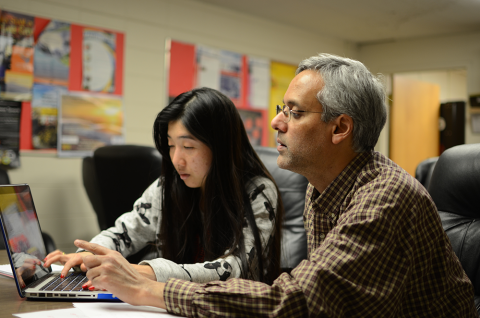PhD or Master's in Math? That is the Question.
Why do you need an advanced degree in mathematics? Because you want to advance to the top of your field. A math master’s or PhD is required to teach at an advanced level, and a graduate degree in math is recommended  for most high-level positions in government and industry.
for most high-level positions in government and industry.
The great thing about math is that it applies to everything — from the health industry to the banking industry, from education to engineering, from logistics to neuroscience. Your math graduate degree will give you the analytical and problem-solving skills needed for any job after graduation, whether that’s working in academia or in the private or public sectors.
To figure out whether you should choose to pursue your math master’s or your PhD in mathematics, it’s a good idea to look at them side by side and see which program fits your personal goals.
Math Master’s Degree
Students who graduate with their master’s in math are equipped for a range of careers. Earning your master’s typically takes about two years, so you can return to the workforce sooner with a higher level of expertise than your peers.
With your math master’s, you can become a better high school teacher and opportunities to teach at the community college level can open to you. At either level, you’d be helping young students realize the excitement and complexity of your field. This is a great option if you’ve already earned an undergraduate education degree or teaching certification.
Another career option is conducting research for various industries and government agencies. You can work in robotics, health care, the financial sector, aviation, technology and more — the possibilities are vast. Mathematicians creatively and meticulously study and solve problems, and pretty much any industry can utilize that expertise.
And if you’re looking to learn even more, earning your master’s is a great prep for doctoral studies in math or if you’re not sure about your post-grad career options. Most of our math master’s students at UL Lafayette choose to pursue their master’s and PhD simultaneously or attend another university for their PhD in math.
PhD in Mathematics Degree
Typically, students who pursue a PhD in math choose a career in academia. A PhD is needed to teach at the university level, because you’re sharing your intense expertise with students, helping them do research and delve deeper into the field you love so much.
If you teach at a research university, you’ll teach high-level classes and you’ll have the
opportunity to continue complex and speculative research. As a PhD student, you’ll begin to discover and invent new math, and you can continue doing just that as a professor, forging a path for yourself and your research.
Earning your PhD in math widens your academic career opportunities, and you get to spend your career as a student and then as a professor learning more about your passions.
There are also plenty of opportunities to work for private companies or governmental organizations. Many of our PhD in mathematics alumni work in medicine, engineering, and software development, applying the knowledge they gained in their PhD program to help solve complex, real-world problems.
Some of our recent UL Lafayette math PhD alumni include:
- Peter Xiao, who holds 8 U.S. patents and is engineering director at CISCO;
- Jie Yang, associate actuary at Humana, Inc.;
- Sowmya Muniswamy, assistant professor at the Rashtriya Vidyalaya College of Engineering in Bangalore, India;
- Dan Zhang, statistician at L2C, Inc.;
- Jie Peng, assistant professor in the Department of Economics at St. Ambrose University;
- Haochun Zhang, quantitative analyst at Pittsburgh National Corporation; and
- Shuhua Hu, senior research scientist at the Center for Research in Scientific Computation at North Carolina State University.
